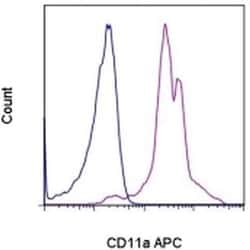Learn More
Invitrogen™ CD11a (LFA-1alpha) Monoclonal Antibody (M17/4), APC, eBioscience™, Invitrogen™



Description
Description: The M17/4 monoclonal antibody reacts with mouse CD11a, the 180 kDa integrin alpha L, also known as the lymphocyte function associated antigen-1 (LFA-1) alpha chain. LFA-1, formed by non-covalent association of CD11a with CD18 (integrin beta 2), serves as an important adhesion molecule involved in lymphocyte and granulocyte function. CD54 (ICAM-1), CD102 (ICAM-2), and CD50 (ICAM-3) are ligands for LFA-1. CD11a is expressed by all leukocytes. Applications Reported: This M17/4 antibody has been reported for use in flow cytometric analysis. Applications Tested: This M17/4 antibody has been tested by flow cytometric analysis of mouse splenocytes. This can be used at less than or equal to 0.5 μg per test. A test is defined as the amount (μg) of antibody that will stain a cell sample in a final volume of 100 μL. Cell number should be determined empirically but can range from 10^5 to 10^8 cells/test. It is recommended that the antibody be carefully titrated for optimal performance in the assay of interest. Excitation: 633-647 nm; Emission: 660 nm; Laser: Red Laser. Filtration: 0.2 μm post-manufacturing filtered.

Specifications
Specifications
| Antigen | CD11a (LFA-1alpha) |
| Applications | Flow Cytometry |
| Classification | Monoclonal |
| Clone | M17/4 |
| Concentration | 0.2 mg/mL |
| Conjugate | APC |
| Formulation | PBS with 0.09% sodium azide; pH 7.2 |
| Gene | ITGAL |
| Gene Accession No. | P24063 |
| Gene Alias | (p180); alpha L integrin; antigen CD11A (p180); antigen CD11A (p180), lymphocyte function-associated antigen 1, alpha polypeptide; antigen CD11A p180; CD11 antigen-like family member A; CD11a; integrin alpha L; integrin alphaL; integrin alpha-L; integrin alpha-L precursor; integrin gene promoter; integrin subunit alpha L; integrin surface receptor; integrin, alpha L; integrin, alpha L (antigen CD11A (p180), lymphocyte function-associated antigen 1; alpha polypeptide); ITGAL; Leukocyte adhesion glycoprotein LFA-1 alpha chain; leukocyte function-associated molecule 1 alpha chain; LFA-1; LFA-1 alpha; LFA1A; LFA-1A; Ly-15; Ly-21; lymphocyte antigen 15; lymphocyte function associated antigen 1, alpha polypeptide; lymphocyte function-associated antigen 1; lymphocyte function-associated antigen 1, alpha polypeptide; lymphocyte function-associated antigen-1 |
| Show More |
For Research Use Only.
By clicking Submit, you acknowledge that you may be contacted by Fisher Scientific in regards to the feedback you have provided in this form. We will not share your information for any other purposes. All contact information provided shall also be maintained in accordance with our Privacy Policy.
